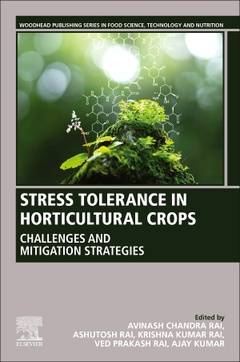Stress Tolerance in Horticultural Crops Challenges and Mitigation Strategies
Coordonnateurs : Kumar Ajay, Chandra Rai Avinash, Rai Ashutosh, Kumar Rai Krishna, Rai Ved Prakash

Stress Tolerance in Horticultural Crops: Challenges and Mitigation Strategies explores concepts, strategies and recent advancements in the area of abiotic stress tolerance in horticultural crops, highlighting the latest advances in molecular breeding, genome sequencing and functional genomics approaches. Further sections present specific insights on different aspects of abiotic stress tolerance from classical breeding, hybrid breeding, speed breeding, epigenetics, gene/quantitative trait loci (QTL) mapping, transgenics, physiological and biochemical approaches to OMICS approaches, including functional genomics, proteomics and genomics assisted breeding.
Due to constantly changing environmental conditions, abiotic stress such as high temperature, salinity and drought are being understood as an imminent threat to horticultural crops, including their detrimental effects on plant growth, development, reproduction, and ultimately, on yield. This book offers a comprehensive resource on new developments that is ideal for anyone working in the field of abiotic stress management in horticultural crops, including researchers, students and educators.
1. Horticultural crops and abiotic stress challenges2. Conventional breeding approaches for abiotic stresses management in horticultural crops3. Hybrids and abiotic stress tolerance in horticultural crops4. Speed breeding: a powerful tool for mitigating abiotic stresses5. Marker assisted breeding for abiotic stress tolerance in horticultural crops6. Epigenetics in horticultural crops: consequences and application in abiotic stress tolerance7. Functional genomics approaches for combating the effect of abiotic stresses8. Crosstalk between miRNA and plant abiotic stresses9. Molecular chaperones: a key player for combating the effect of abiotic stresses10. Transcription Factors: A tool box for countering the effect of abiotic stresses11. Physiological and biochemical approaches for mitigating the effect of abiotic stresses12. Current approaches in horticultural crops to mitigate the effect of drought stress13. Current approaches in horticultural crops to mitigate the effect of cold stress14. Current approaches in horticultural crops to mitigate the effect of salt stress15. Current approaches in horticultural crops to mitigate the effect of metal stress16. Current approaches in horticultural crops to mitigate the effect of water logging stress17. Advancement in transgenics for combating abiotic stresses 18. Signalling responses and their role in the mitigation of abiotic stresses19. Role of phytohormones as master regulators during the abiotic stresses20. Proteomics approaches in horticultural crops for abiotic stress tolerance21. Whole genome sequencing in horticultural crops: towards mitigating the abiotic stresses22. Use of modern physical tools for mitigating the effect of abiotic stresses
Dr. Avinash Chandra Rai is currently working as a visiting scientist at Agriculture Research Organization, The Volcani Center, Bet Dagan, Israel. Dr. Rai has been completed his Ph.D. degree in Biotechnology from Banaras Hindu University, Uttar Pradesh, India. He is currently serving as a visiting Scientist in Institute of Plant Sciences, Agricultural Research Organization-The Volcani Centre, Israel. He has more than thirteen years of research experience, particularly in the area of plant molecular biology and plant physiology. His research interest is in deciphering the insights of plant abiotic stresses with the applications of molecular and physiological tools. He also has a keen interest in emerging environmental and physiological issues of crop plants. He is currently working to see the effect of auxin and ethylene in the process of abscission in mango and find out the role of essential gene involved in the pathways mechanism in abscission of fruit. Dr. Rai has more than seventeen research article
- Describes advances in whole genome and next generation sequencing approaches for breeding climate smart horticultural crops
- Details advanced germplasm tolerance to abiotic stresses screened in the recent past and their performance
- Includes advancements in OMICS approaches in horticultural crops
Date de parution : 05-2021
Ouvrage de 376 p.
21.4x27.6 cm
Thèmes de Stress Tolerance in Horticultural Crops :
Mots-clés :
Agriculture; Breeding; Hybrids; Functional Genomics; Molecular Breeding; Omics; Physiological; Phytohormones; Signalling; Transgenic



